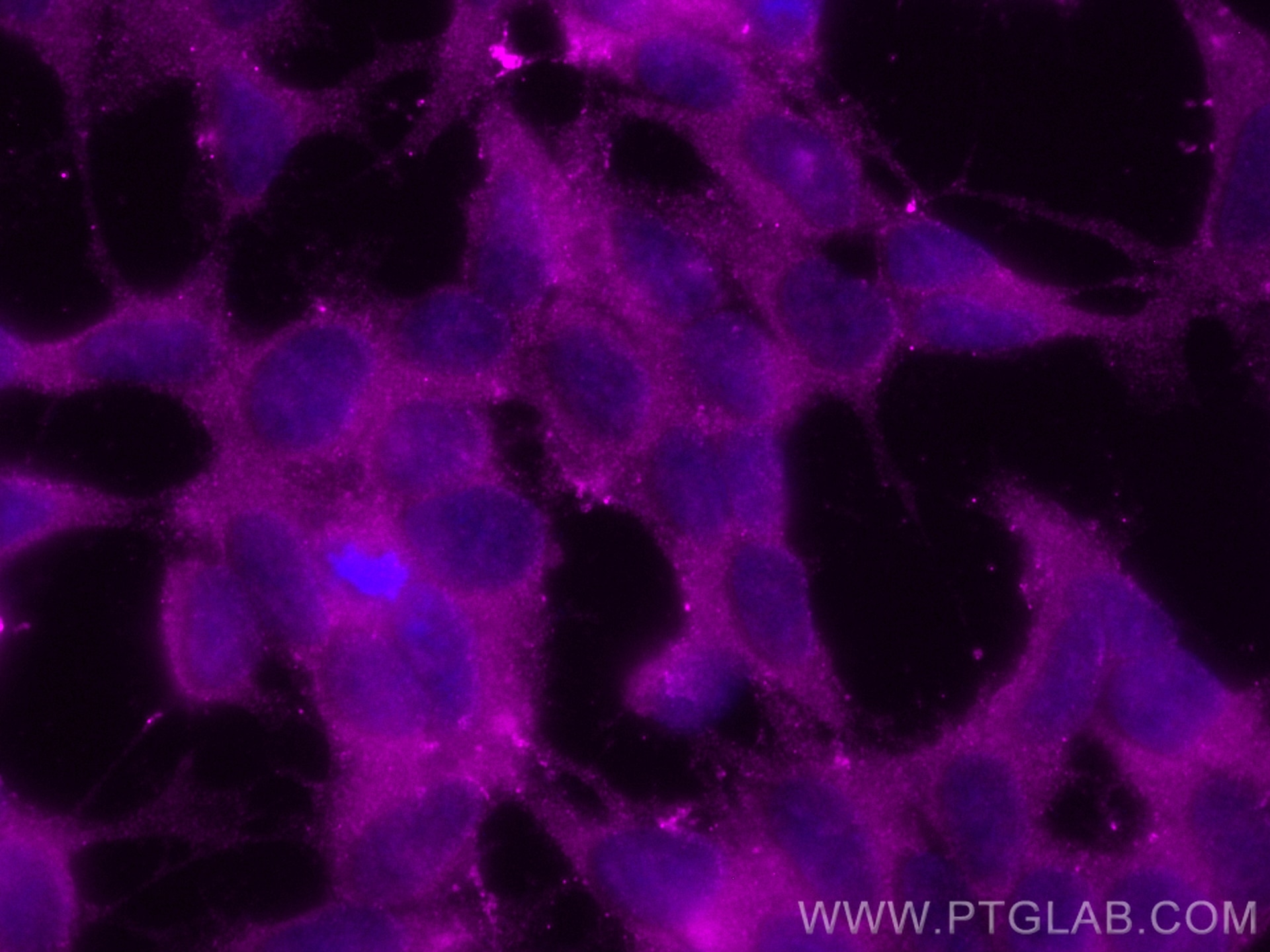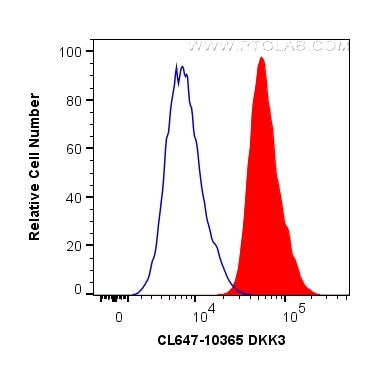- Phare
- Validé par KD/KO
Anticorps Polyclonal de lapin anti-DKK3
DKK3 Polyclonal Antibody for IF/ICC, FC (Intra)
Hôte / Isotype
Lapin / IgG
Réactivité testée
Humain, souris
Applications
IF/ICC, FC (Intra)
Conjugaison
CoraLite® Plus 647 Fluorescent Dye
N° de cat : CL647-10365
Synonymes
Galerie de données de validation
Applications testées
| Résultats positifs en IF/ICC | cellules SH-SY5Y, |
| Résultats positifs en FC (Intra) | cellules HepG2 |
Dilution recommandée
| Application | Dilution |
|---|---|
| Immunofluorescence (IF)/ICC | IF/ICC : 1:50-1:500 |
| Flow Cytometry (FC) (INTRA) | FC (INTRA) : 0.20 ug per 10^6 cells in a 100 µl suspension |
| It is recommended that this reagent should be titrated in each testing system to obtain optimal results. | |
| Sample-dependent, check data in validation data gallery | |
Informations sur le produit
CL647-10365 cible DKK3 dans les applications de IF/ICC, FC (Intra) et montre une réactivité avec des échantillons Humain, souris
| Réactivité | Humain, souris |
| Hôte / Isotype | Lapin / IgG |
| Clonalité | Polyclonal |
| Type | Anticorps |
| Immunogène | DKK3 Protéine recombinante Ag0417 |
| Nom complet | dickkopf homolog 3 (Xenopus laevis) |
| Masse moléculaire calculée | 38 kDa |
| Poids moléculaire observé | 55 kDa |
| Numéro d’acquisition GenBank | BC007660 |
| Symbole du gène | DKK3 |
| Identification du gène (NCBI) | 27122 |
| Conjugaison | CoraLite® Plus 647 Fluorescent Dye |
| Excitation/Emission maxima wavelengths | 654 nm / 674 nm |
| Forme | Liquide |
| Méthode de purification | Purification par affinité contre l'antigène |
| Tampon de stockage | PBS with 50% glycerol, 0.05% Proclin300, 0.5% BSA |
| Conditions de stockage | Stocker à -20 °C. Éviter toute exposition à la lumière. Stable pendant un an après l'expédition. L'aliquotage n'est pas nécessaire pour le stockage à -20oC Les 20ul contiennent 0,1% de BSA. |
Informations générales
DKK3, also named as REIC, belongs to the dickkopf family. It antagonizes canonical Wnt signaling by inhibiting LRP5/6 interaction with Wnt and by forming a ternary complex with the transmembrane protein KREMEN that promotes internalization of LRP5/6. DKKs play an important role in vertebrate development, where they locally inhibit Wnt regulated processes such as antero-posterior axial patterning, limb development, somitogenesis and eye formation. In the adult, Dkks are implicated in bone formation and bone disease, cancer and Alzheimer's disea. The adenovirus carrying REIC/Dkk-3 (Ad-REIC) exhibits a potent tumor-specific cell-killing function for various human cancers. It has also become evident that some human cancers are resistant to Ad-REIC-induced apoptosis. The DKK3 is a Glycosylation protein with MW about 55 kDa or 38-43 kDa.
Protocole
| Product Specific Protocols | |
|---|---|
| IF protocol for CL Plus 647 DKK3 antibody CL647-10365 | Download protocol |
| FC protocol for CL Plus 647 DKK3 antibody CL647-10365 | Download protocol |
| Standard Protocols | |
|---|---|
| Click here to view our Standard Protocols |



